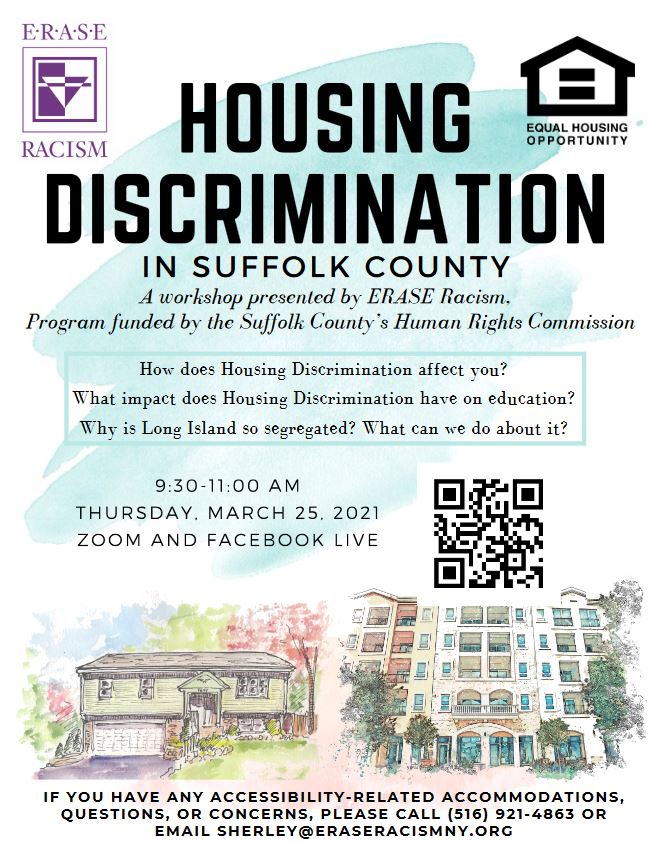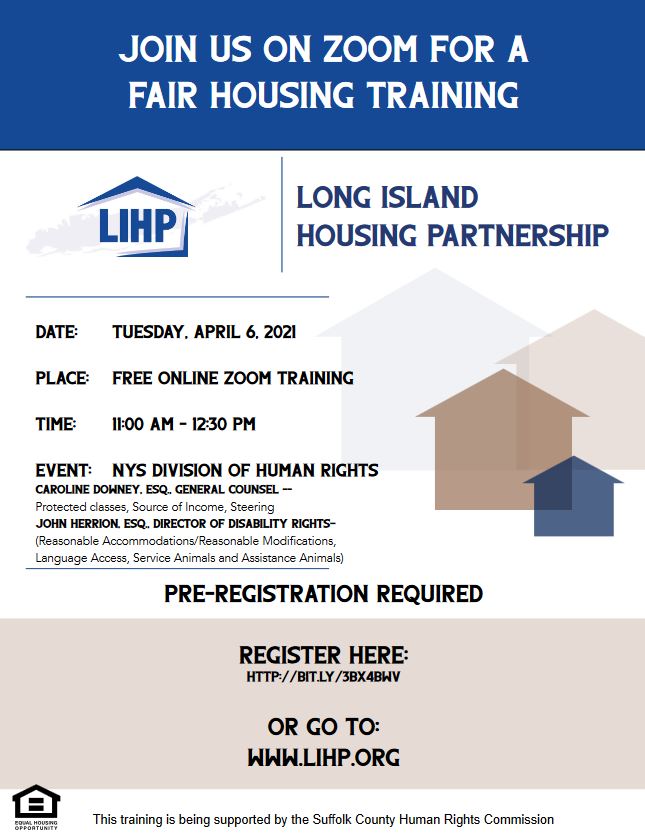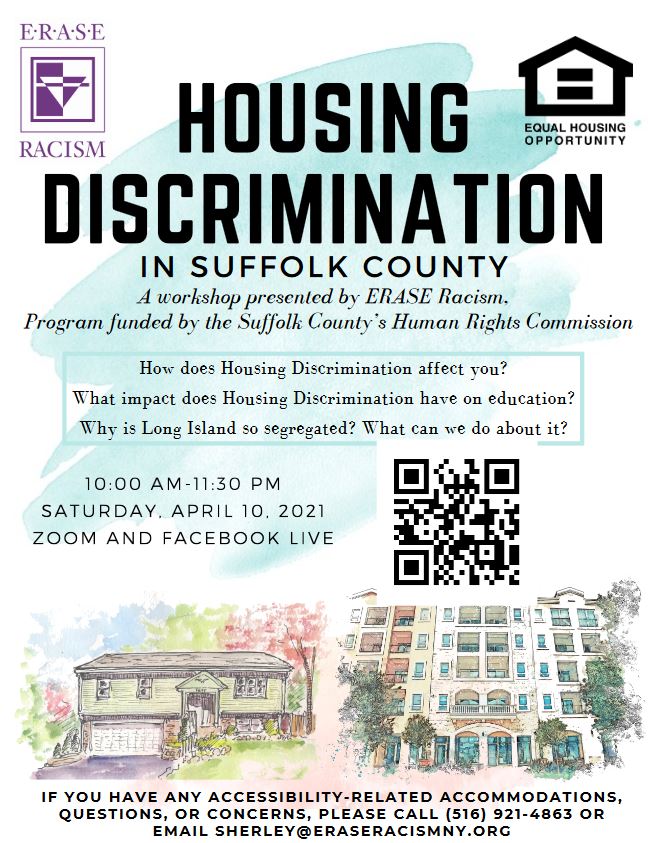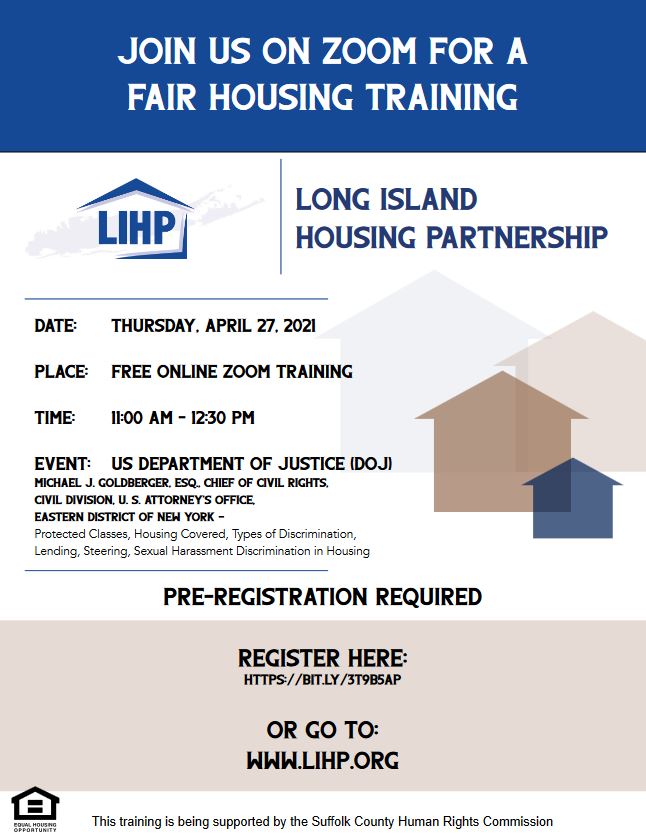Employment
Both the New York State and Suffolk County Human Rights Laws protects workers against discrimination or harassment based on their age, race, creed, color, national origin, sexual orientation, gender identity or expression, military status, sex, disability, predisposing genetic characteristics, familial status, marital status, status as a victim of domestic violence, arrest record or conviction record, or sincerely held practice of religion.
Both laws also:
- Make it an unlawful discriminatory practice to ask an applicant or employee whether they have ever been arrested or had a criminal accusation filed against them.
- Under Suffolk County Code, Chapter 528-7(12) it is also unlawful to inquire about a person’s prior criminal conviction on an employment application or during an interview.
- Require employers to reasonably accommodate an employee’s religious practices, an employee’s disability, and an employee’s pregnancy-related condition.
- Make it an unlawful discriminatory practice for an employer to treat applicants or employees differently based on religious beliefs or practices, in any area of employment, including recruitment, hiring, assignments, discipline, promotion, and benefits.
- Make it an unlawful discriminatory practice for employers to subject employees to harassment because of religious beliefs or practices. It is also illegal for employers to retaliate against applicants or employees for reporting alleged religious discrimination in the workplace.
- Makes it an unlawful discriminatory practice to deny employment, to refuse to hire, to terminate, or to take an adverse employment action against an applicant or employee because of their conviction record unless there is a direct relationship between a prior criminal offense and the specific employment sought or held or employment of that individual would involve an unreasonable risk to property or to the safety or welfare of specific individuals or the general public. N.Y. Exec. Law § 296(15).
- Prohibit employers from retaliating against employees—taking action that would punish an employee and or worker in some form—for complaining about potential employment law violations, providing information to government agencies, or participating in governmental proceedings.
Use the below complaint form:
- If you are an employee filing a complaint against your employer, a domestic worker, or an intern or a volunteer filing against an employer.
- If you are used by non-employees and experience discrimination while working at an employer’s worksite. (This includes independent contractors, persons working for a contractor, temp workers, vendors, consultants, delivery persons, and service providers such as electricians, janitorial workers, and so on.)
- If you were denied a license by a licensing agency or if you experienced illegal discrimination by a union or by an employment or temporary agency.
File a complaint: Visit our online Sivil Portal OR print out paper forms in English or Spanish
Housing
The County Executive is committed to preventing housing discrimination and promoting compliance with federal, state, and local fair housing laws. Training and education for residents and businesses on their rights and responsibilities under fair housing laws are necessary to combat fair and equitable housing impediments. Education and training opportunities and additional resources are listed below:
Suffolk County Fair Housing Law: Chapter §528-9
Additional Resources:
Suffolk County Human Rights Law: https://suffolkcountyny.gov/Departments/Human-Rights-Commission/Fair-Housing
NYS Fair Housing Guide PDF: https://dhr.ny.gov/system/files/documents/2022/05/nysdhr-fair-housing-guide-2021.pdf
NYS Guidance on Protections from Source of Income in Housing Under the New York Human Rights Law PDF: https://dhr.ny.gov/system/files/documents/2022/05/nysdhr-soi-guidance-2020.pdf
NYS Division of Human Rights Sexual Harassment in Housing PDF: https://dhr.ny.gov/system/files/documents/2022/05/nysdhr-housing-sexual-harassment.pdf
NYS Rights of Persons with Disabilities in Housing Trifold Pamphlet PDF: https://dhr.ny.gov/system/files/documents/2022/05/housing_disabilities.pdf
File a complaint: Visit our online Sivil Portal OR print out paper forms in English or Spanish
Education, Credit, Public Accommodations & Volunteer Firefighting
- Public Accommodation
Use the form below to file a complaint if you experienced discrimination as a customer or client of any establishment offering goods or services to the public (for example: stores, theatres, restaurants, transportation services, public buildings, salons, medical offices, day care services, parks, fitness and recreation facilities, etc., including any such facilities owned or operated by a governmental entity).
File a complaint: Visit our online Sivil Portal OR print out paper forms in English or Spanish
- Credit
Use the form below to complain of discriminatory denial of credit or insurance
NOTE:
- Use the housing complaint form for denial of a mortgage or any housing-related credit
- Use the employment complaint form for issues about insurance benefits provided by your employer
File a complaint: Visit our online Sivil Portal OR print out paper forms in English or Spanish
- Education
Use the form below to file a complaint as a current or former student, or as an applicant, against any public school (including public school districts, charter school, BOCES, public colleges and universities, universal Pre-K, Head Start or other publicly funded pre-kindergarten program), or any private school at any education level, excluding those which are for-profit, or run by a religious organization. (If you are not sure of the for-profit or religious nature of a school, you may file a complaint and we will investigate the status of the school as a preliminary matter.)
- Volunteer Firefighters
Use the following form if you are filing a complaint as a volunteer firefighter:
File a complaint: Visit our online Sivil Portal OR print out paper forms in English or Spanish
Discrimination Complaint Intake Process
Intake
The first step in the process is Intake. Individuals who believe that they have been discriminated against may telephone, write, email, or come into our office and speak to an investigator about their situation. An extensive intake interview is conducted to obtain all the pertinent facts, explain our process and advise the complainant of available options.
The Commission always encourages early and ongoing settlement efforts, which benefits both parties.
Inquiry
Often, a situation arises that is not within our area of jurisdiction. In those situations, our staff members carefully evaluate the information. In other instances, the problem can be resolved without the need for a formal complaint. We have the flexibility to attempt to clarify the situation and/or to settle the matter by sending a letter of inquiry to the respondent and subsequent conversations with both parties.
Complaint
When the situation has not been resolved or when the circumstances dictate, the intake investigator will draft a formal complaint for the complainant’s notarized signature. Depending upon the circumstances of the complaint, these formal charges may be filed under local, state, and/or federal law. The complaint is served on the respondent.
Respondent’s Answer & Complainant’s Rebuttal
The respondent’s answer is usually sent to the complainant, along with a request for a written rebuttal. The complainant may submit a rebuttal in writing or meet with the investigator to give a verbal rebuttal. The rebuttal process can also be undertaken by telephone or by e-mail.
Investigation
Every complainant is offered the opportunity to show that the alleged discriminatory basis was the reason for the respondent’s actions. However, the Commission ultimately determines the level of investigation necessary to address the issues raised.
The investigation includes securing relevant documents and obtaining other pertinent data necessary to address the charges. Relevant witnesses are contacted and interviewed about the circumstances surrounding the complaint. Their statements can be a valuable tool in ascertaining the validity of a charge.
Recommended Finding
When the investigation is completed, the information that has been gathered is carefully analyzed and documented, and the investigator prepares an investigative report along with recommended findings.
Findings
The executive director reviews the file and the investigative report, and if she agrees with the findings, she signs off on the report. The Commission’s recommended findings are then submitted to the NY State Division of Human Rights. If the State Division concurs with our “no probable cause” finding, then the case is closed. If they concur with a “probable cause” finding, the case is scheduled for a formal public hearing before an administrative law judge. The administrative law judge has the authority to compel the respondent to make restitution to the complainant, in whatever amount the judge deems appropriate.
However, in housing cases filed under the county’s local law, the Commission issues the final determination. Where probable cause has been determined, a hearing before an administrative law judge will be held at the county level.
Appeal
If it is determined that there is no probable cause to believe that an unlawful act of discrimination has occurred, then the complaint is dismissed and the complainant is provided with information explaining the timeframes and process for filing an appeal.
Archive of Suffolk County Education & Training
FAIR HOUSING…IT’S THE LAW
The County Executive is committed to preventing housing discrimination and promoting compliance with federal, state, and local fair housing laws. Training and education for residents and businesses on their rights and responsibilities under fair housing laws are necessary to combat fair and equitable housing impediments. Education and training opportunities and additional resources are listed below:
 Download
Download
March 25, 2021
Fair Housing Flyer
 Download
Download
April 6, 2021
Fair Housing Flyer
 Download
Download
April 10, 2021
Fair Housing Flyer
 Download
Download
April 27, 2021
Fair Housing Flyer
FAIR HOUSING RESOURCES & LINKS
GOVERNMENT:
U.S. Housing and Urban Development (HUD)
U.S. Department of Justice (DOJ)
New York State Fair Housing Guidance
NYS Division of Human Rights
NYS Department of State Division of Licensing Services – REALTORS®
NYS Homes and Community Renewal
Nassau County Human Rights Commission
Suffolk County Human Rights Commission
PRIVATE FAIR HOUSING & LEGAL SERVICE AGENCIES:
Lambda Legal
Nassau-Suffolk Law Services
Fair Housing Justice Center
Long Island Housing Services (LIHS)